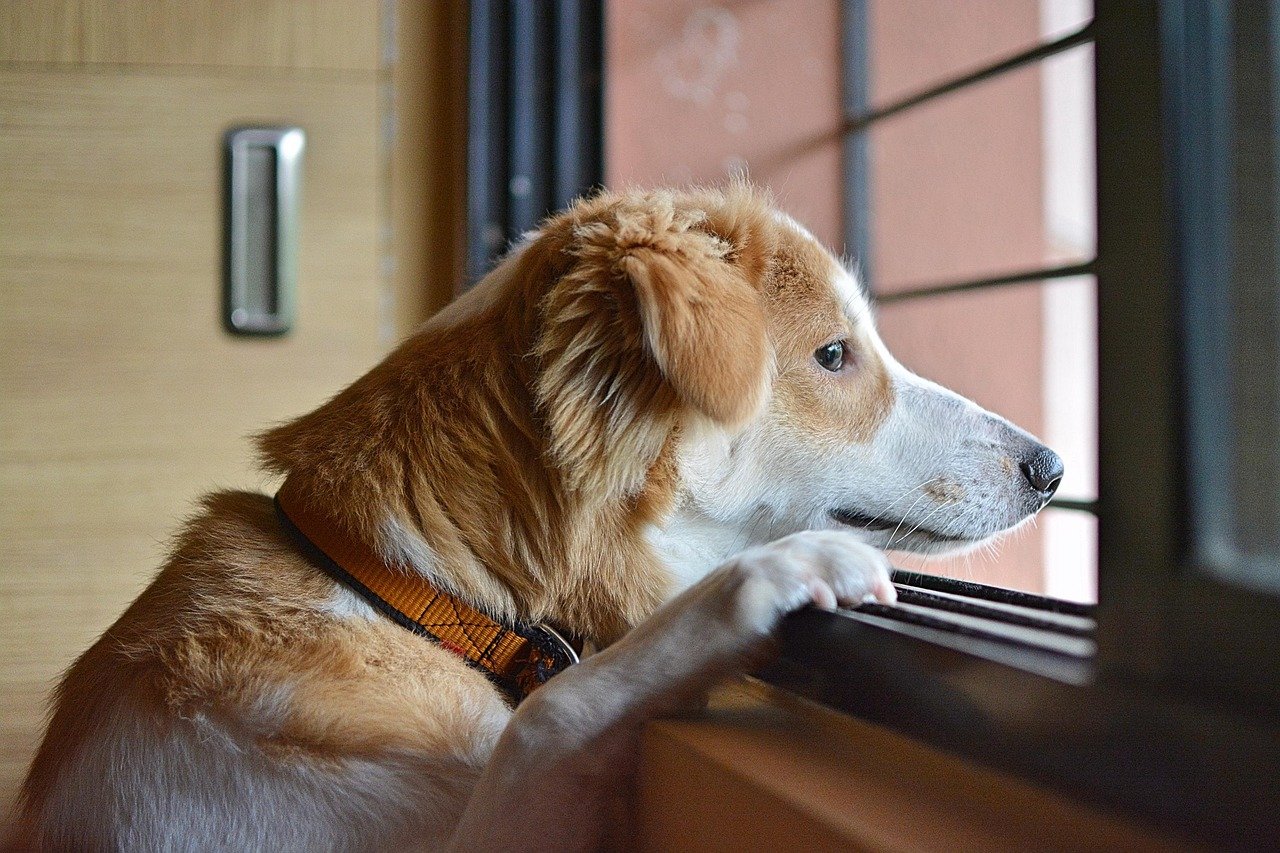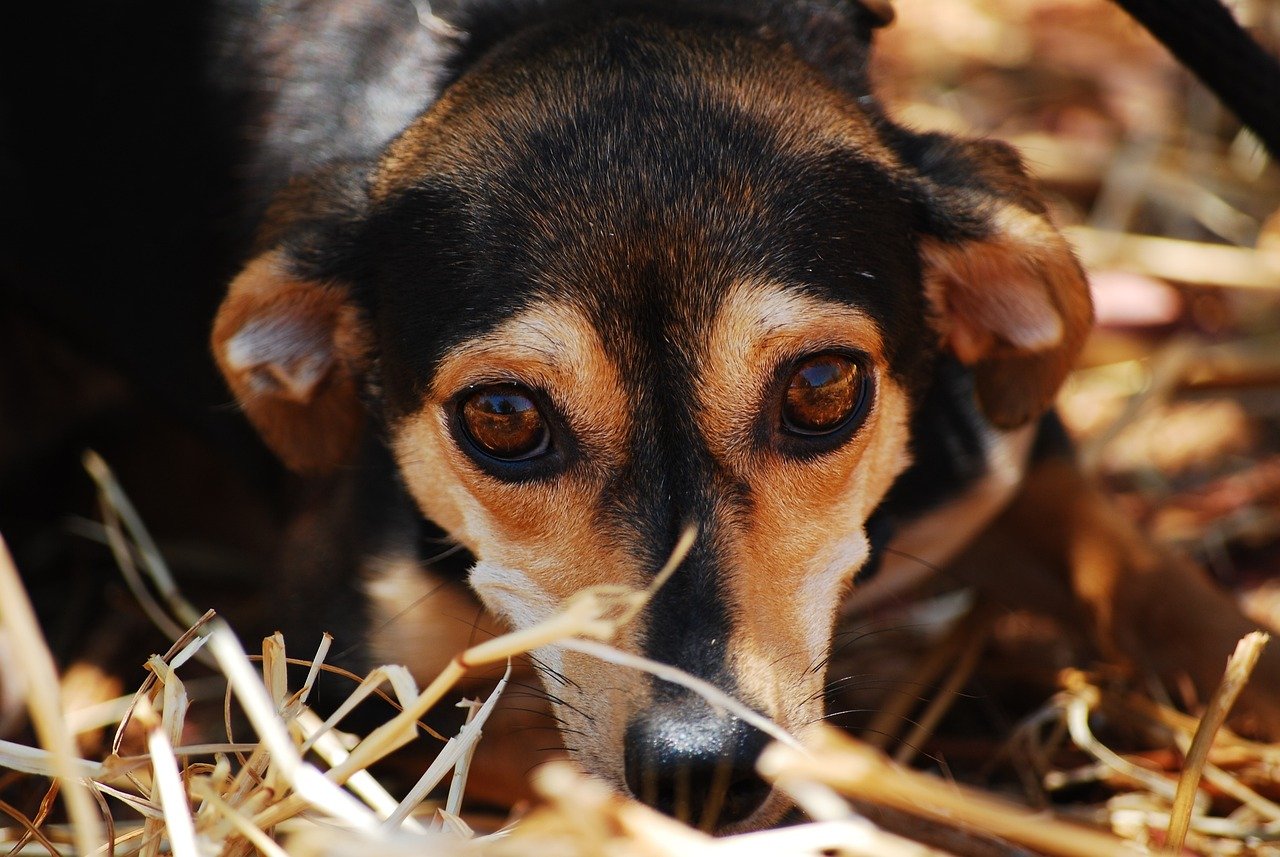Is your furry friend giving you those soulful eyes when you walk out the door? If you’ve ever felt a pang of guilt leaving your dog home alone, you’re not alone. Many dog lovers wonder what really goes on in their pet’s mind during those long hours apart. Dogs, with their loyal hearts and sensitive souls, can struggle to make sense of your absence. Recognizing the subtle (and sometimes not-so-subtle) signs can help you understand what your pup is feeling. Let’s unravel the mystery behind those wagging tails and whimpers—here are 12 telltale signs your dog is wrestling with your daily departures.
1. Excessive Barking or Howling

One of the most obvious signs your dog is struggling with your absence is constant barking or howling. This isn’t just random noise—it’s your pup’s way of calling out for you, almost like a child yelling for their parent. Dogs are social creatures, and when their pack leader disappears, it can trigger a wave of anxiety. If neighbors mention your dog’s “concerts” while you’re away, take it as an emotional SOS. Sometimes, it’s a lonely bark, but often it turns into a mournful howl, echoing through the house. This vocalization is their way of asking, “Where are you?” Imagine them as little furry detectives, calling into the void, hoping you’ll answer back. These sounds are a window into their confusion and longing.
2. Destructive Chewing or Digging

Have you come home to find a shredded pillow, chewed-up shoes, or mysterious holes in the backyard? Dogs often act out their confusion and frustration through destruction. This isn’t mischief—it’s stress relief. When they can’t figure out why you’ve left, some dogs channel their energy into chewing or digging. It’s a bit like nervous nail-biting for humans. They might focus on your belongings because your scent is comforting, but in your absence, their anxiety gets the best of them. Even the most well-behaved pups can fall into this habit, leaving you with a mess and them with a temporary sense of relief. It’s not spite—it’s longing.
3. Loss of Appetite

Food is usually a highlight for most dogs, so if your pup ignores their bowl while you’re gone, it’s a red flag. Dogs can lose their appetite when they’re anxious or sad, just like people do. If you notice uneaten food, it could be a sign your dog’s world feels a little empty without you there. Sometimes they simply wait until you return, hoping you’ll share a snack or meal together. Their refusal to eat isn’t about the food—it’s about missing their favorite dining companion. This subtle change is easy to overlook, but it speaks volumes about your bond.
4. Pacing or Restlessness

Does your dog wear a path in the carpet while you’re out? Pacing is a classic sign of unease. Some dogs will walk back and forth for hours, stopping occasionally to listen for the sound of your car or footsteps. This restless behavior is their way of trying to solve the puzzle of your disappearance. They might circle the house, checking every door and window, as if expecting you to magically appear. Over time, this can become a compulsive habit, making it hard for them to relax. It’s like they’re searching for the ending to a story that doesn’t make sense without you in it.
5. Accidents in the House
If your house-trained dog suddenly starts having accidents inside, it’s more than just an inconvenience—it’s a message. Stress and confusion can disrupt their normal routine, leading to bathroom mishaps. Your absence can create such a sense of chaos that even basic habits fall by the wayside. Dogs thrive on routine, and when you’re gone, the world feels unpredictable. These accidents aren’t acts of rebellion. Instead, they’re physical signs of emotional turmoil. It’s as if your dog’s internal clock is thrown off, and they’re struggling to keep it together until you return.
6. Clinginess When You Return
Ever noticed how your dog sticks to you like glue the moment you walk through the door? Clinginess is a big giveaway that your absence has been tough on them. They might follow you from room to room, lean against your legs, or refuse to let you out of their sight. This behavior is their way of making sure you don’t disappear again. It’s a mix of relief, love, and a bit of insecurity. They’re not just happy to see you—they’re trying to store up enough togetherness to last until the next time you’re gone. It’s both heartwarming and a little heartbreaking.
7. Loss of Interest in Favorite Toys
Toys are usually a source of endless joy for dogs, but when they’re missing you, even their favorite squeaky ball might lose its magic. If you notice toys untouched or gathering dust, it’s a sign your dog’s heart isn’t in it. Playtime is more fun when shared, and without you, their world feels a bit dull. Sometimes, they might carry your belongings around instead, seeking comfort in your scent. It’s their way of holding onto you, even when you’re not there. A drop in playfulness is a clear sign your absence is weighing on them.
8. Waiting by Doors or Windows

Dogs are masters of anticipation. If your pup spends hours stationed by the door or peeking out the window, they’re hoping for your return. This constant lookout is more than curiosity—it’s longing. They scan every car, every footstep, searching for the one that means home. It’s a little like waiting for a loved one at an airport, eyes glued to the arrivals gate. Some dogs even develop a routine, showing up at the same spot every day around the time you usually come home. It’s touching and a bit heart-wrenching to witness such devotion.
9. Desperate Greetings
When you finally come home, does your dog greet you like you’ve been gone for a year, even if it was just a few hours? Wild tail wags, excited jumps, and even a few happy whimpers are all signs of pent-up emotion. These greetings can be so exuberant that it feels like a celebration, complete with full-body wiggles. It’s not just happiness—it’s relief. Your return mends the world your dog has been struggling to understand all day. Their greeting is a joyful explosion of love, but it’s also a hint at how hard it’s been for them while you were away.
10. Changes in Sleeping Patterns

A dog’s sleep schedule often mirrors their emotional state. If your pup sleeps more when you’re gone, it might be their way of passing the time or escaping loneliness. On the flip side, some dogs can’t settle at all, napping lightly or waking at every sound, hoping it’s you. You might notice your dog sleeping in your spot or cuddling with your clothes for comfort. These changes in sleep aren’t random—they’re emotional coping mechanisms. It’s as if their dreams are on pause, waiting for you to press play again.
11. Excessive Licking or Grooming
Some dogs deal with stress by licking themselves—sometimes to the point of creating bald patches or sores. This repetitive behavior is a way to self-soothe, like a child with a security blanket. If you return home to find your dog’s fur damp or notice raw spots, it could be a sign they’re struggling with your absence. This isn’t just a hygiene habit; it’s an emotional response. Over-grooming is their way of coping when the world feels uncertain. It’s a silent but powerful plea for comfort and reassurance.
12. Sudden Fearfulness or Startle Responses

A dog who’s usually fearless may become jumpy or anxious when left alone too often. Sudden noises, unfamiliar sights, or even routine household sounds can trigger exaggerated responses. This heightened sensitivity is rooted in stress and confusion. Your absence disrupts their sense of safety, making everyday life feel unpredictable. If your dog startles easily or seems more nervous than usual, it’s a sign their emotional foundation is shaky. They’re not just missing you—they’re struggling to feel secure in a world that makes less sense without you.
The signs are all around us—sometimes loud, sometimes heartbreakingly quiet. Dogs feel our absence deeply, often in ways that tug at the heartstrings. Recognizing these signals is the first step toward helping your loyal companion feel more secure, even when you’re not home.

Born and bred in South Africa, a Capetonian at heart. Amy-Leigh’s love for nature and animals was inherited from her Dad. He loves taking the family on road trips to experience nature at its finest; Amy-Leigh’s favourite being whale watching in Hermanus and spotting Kudu along the West Coast. Amy-Leigh holds a BA in English Literature and Communication Studies.






